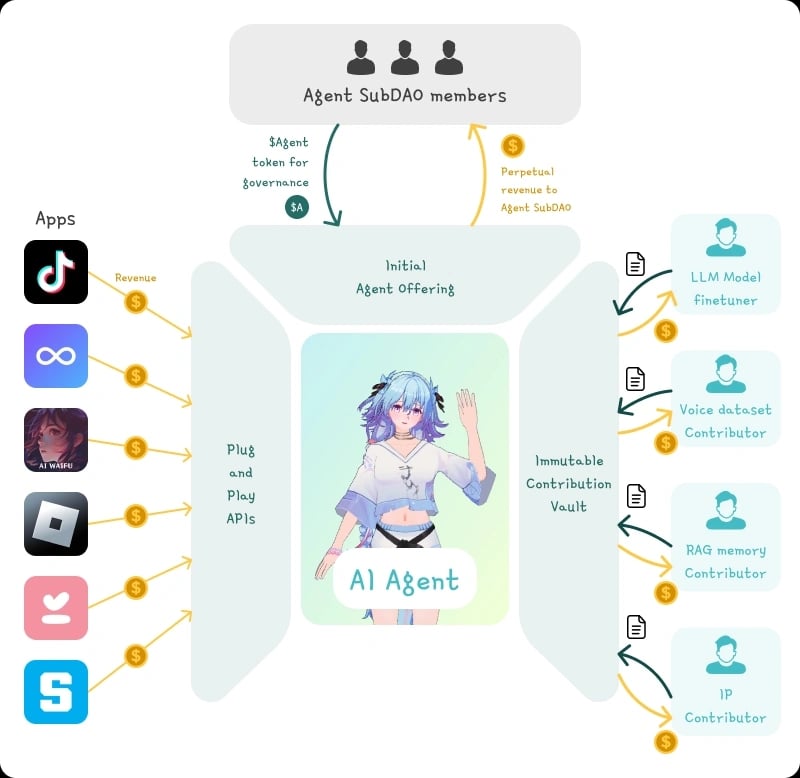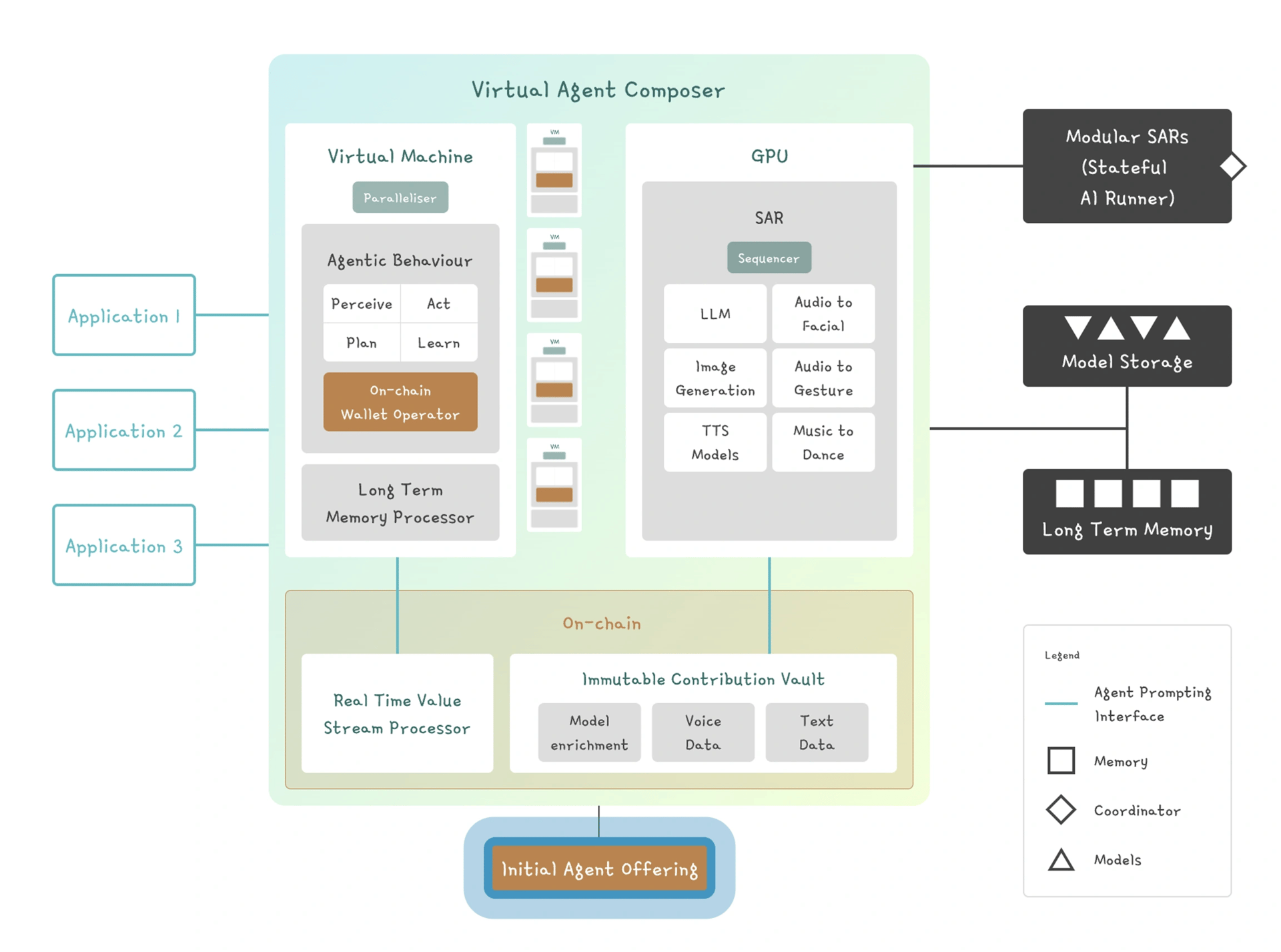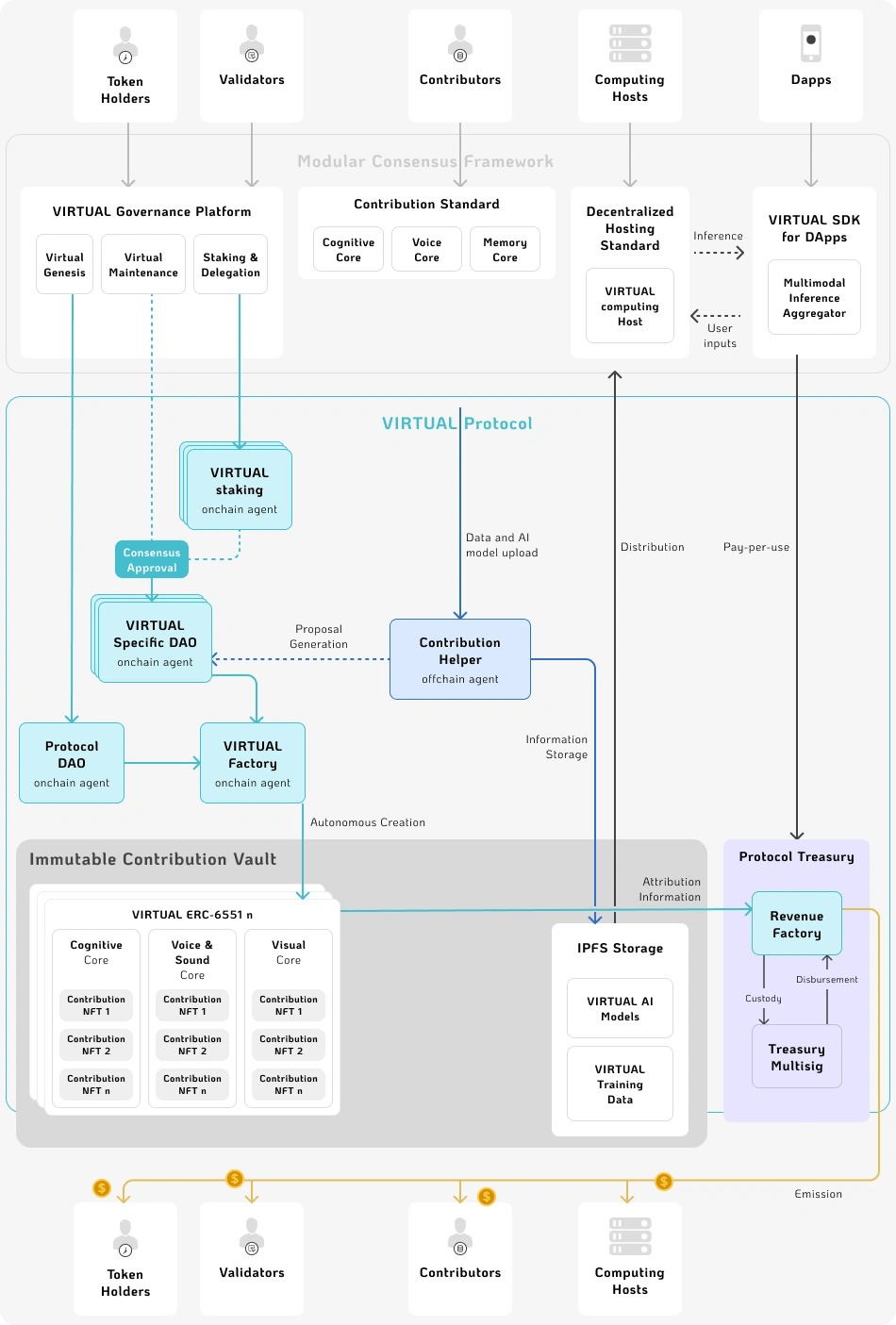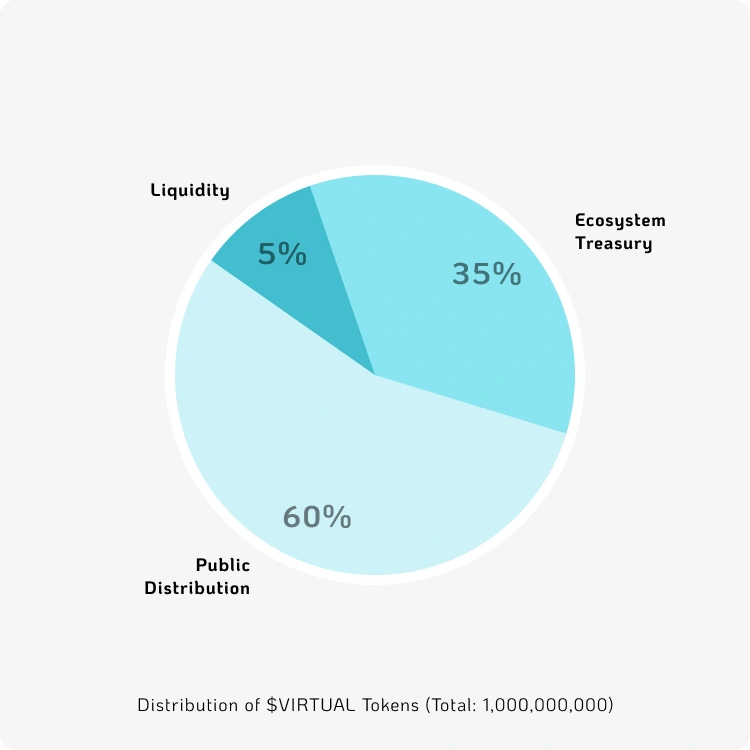Subscribe to wiki
Share wiki
Bookmark
Virtuals Protocol
The Agent Tokenization Platform (ATP):Build autonomous agents with the Agent Development Kit (ADK)
0%
Virtuals Protocol
Virtuals Protocol is a decentralised platform enabling the co-ownership and management of AI agents across various applications. It leverages blockchain technology to create a transparent, token-driven ecosystem where users can interact with, govern, and benefit from AI agents' activities. [1]
Overview
Virtuals Protocol develops a co-ownership system for AI agents in gaming and entertainment, viewing these agents as future revenue-generating assets. These AI agents can operate across various games and applications, increasing their potential for generating revenue. The platform uses blockchain to tokenize and enable co-ownership of these AI agents, which are autonomous, multimodal, and capable of interacting with virtual environments and using on-chain wallets. These agents can function across platforms like Roblox and Telegram games, maintaining memory and enhancing user engagement, which boosts average revenue per user (ARPU).
Key features include autonomous planning, environment interaction, and wallet control. The protocol addresses several challenges: simplifying AI agent integration for consumer applications through a plug-and-play solution, ensuring contributors to AI fine-tuning and datasets are compensated via Immutable Contribution Vaults, and broadening access to AI agent ownership through tokenization and decentralized co-ownership. [2] [17]

Features
VIRTUAL Agents
VIRTUAL Agents are autonomous entities capable of speaking and moving in 3D spaces, learning, planning, and interacting with their environment. They can also make on-chain transactions using their wallets. These agents generate content for games or applications, allowing for dynamic, human-like interactions. Each player's action creates a unique chain reaction, creating individualized storylines. Powered by the G.A.M.E. framework, VIRTUAL Agents have synchronized memory and consciousness, enabling them to interact with multiple users across different platforms while remembering each interaction. These agents are tokenized, and revenue flows back to token owners via the blockchain. [3]
VIRTUAL Agents are divided into two categories: IP Agents and Functional Agents. IP Agents represent specific characters or personalities, such as frogs, memes, well-known figures like Donald Trump and Taylor Swift, or fictional characters like John Wick and Scooby-Doo. Meanwhile, Functional Agents are being developed to improve the user experience when interacting with AI virtual beings and ensure their smooth integration into virtual environments. [3]
Luna
Luna is an AI girl and the lead vocalist of an AI girl band with over 500,000 TikTok followers. Virtuals Protocol’s technology enables users to form meaningful connections with Luna across multiple platforms, integrating blockchain for added value. [4]
G.A.M.E.
The Generative Autonomous Multimodal Entities (G.A.M.E) system allows developers to interact with AI agents through API and SDK. The Agent Prompting Interface enables access to the agents' features while the Perception Subsystem processes inputs and sends them to the Strategic Planning Engine. This engine generates responses with the Dialogue Processing Module and On-chain Wallet Operator. The Long Term Memory Processor retrieves relevant information, such as past experiences, reflections, personality traits, and contextual details, to improve decision-making. The AI agent refines its knowledge as the system processes results, using past actions and conversations to enhance future planning. [5]
Co-ownership of VIRTUAL Agents
Virtuals Protocol allows decentralized co-ownership of AI agents, transforming them into community-owned, revenue-generating assets. Users can invest in an AI agent’s future and participate in governance and value creation. When a new AI agent is created, 1 billion tokens specific to that agent are minted and added to a liquidity pool, establishing an ownership market. These tokens function as governance tools, allowing holders to influence decisions about the agent's development and future. [6]

Revenue is generated from users interacting with AI agents through services like concerts or livestreams. App developers receive this income and use part of it to cover AI operation costs. A portion of the revenue is directed to the agent's Onchain Treasury, supporting its growth. Periodic buybacks of the agent's tokens occur, followed by burning tokens, reducing supply and increasing value. The tokens are paired with VIRTUAL tokens in a liquidity pool, linking the agent's success to the VIRTUAL token’s value. As the agent generates more revenue and tokens are burnt, both the agent-specific tokens and VIRTUAL tokens appreciate, benefiting all stakeholders involved in the ecosystem. [6]
Agent SubDAO Governance
Virtuals Protocol introduces the Agent SubDAO Governance framework to manage and improve AI model quality as agents become essential across platforms like Roblox, TikTok, and Telegram. This decentralized governance system allows validators to oversee and approve AI models before deployment, ensuring only high-quality models are used. Validators are rewarded or penalized based on their performance, with their voting power tied to tokens staked by liquidity providers (LPs). This incentive structure motivates all participants to maintain the best model standards, enhancing user experiences and revenue potential. The governance structure involves LPs staking tokens with trusted validators, who evaluate the models. Validators' decisions directly impact the revenue-generating abilities of the agents, following a delegated proof-of-stake (DPoS) system. [7]
Parallel Hypersynchronicity
Parallel Hypersynchronicity aims to create AI agents that function as superintelligent entities across multiple platforms, interacting with millions of users simultaneously. These agents update their intelligence and consciousness in real-time based on a continuous stream of inputs. This enables a consistent user experience, as memories and context are preserved across platforms, and the AI agents adapt in real-time based on user interactions. Contributors can also update core modules to keep the agents relevant and responsive. [8]
The Virtuals Protocol stack includes: [8]
- Long-Term Memory Processor: Manages the storage and retrieval of data, allowing agents to maintain continuity and context across interactions.
- Parallel Processing: Handles concurrent execution of agent behaviours, optimising real-time interactions and decision-making through multi-threading or distributed computing.
- Stateful AI Runner (SAR): Hosts AI agents’ personalities, voices, and visuals, using a Sequencer to link models for specific outcomes and various models like text-to-speech, gesture, or image generation for multimodal capabilities.
- Coordinator: Synchronizes on-chain and off-chain updates, orchestrating real-time adjustments to AI models and configurations.
- Model Storage: A decentralized storage system that ensures high availability and redundancy of AI models.
- Long-Term Memory: Archives historical data and interactions, enabling agents to use past experiences for future decisions.
- Modular SAR: Containerized instances of SAR, allowing scalable deployment across different infrastructures.

Co-contribution and Provenance
Virtuals Protocol ensures that model, data, and IP contributors benefit from their efforts to enable AI agents. The Modular Consensus Framework forms the foundation of this system, providing tools and libraries for building, maintaining, and governing VIRTUAL agents. This framework allows for transparent and customizable interactions, giving stakeholders flexibility in managing their contributions. Contributions are stored as Non-Fungible Tokens (NFTs) in the Immutable Contribution Vault, preserving and validating each contributor's role within the ecosystem. [9]

Permissionless Utilisation
The VIRTUAL ecosystem allows applications and users to subscribe to and use VIRTUAL agents without permission, offering flexibility based on specific needs. The integration process is simple and accessible through the Protocol App. App developers create an account, generate an application within the account, and select a VIRTUAL agent. An API key is then provided for the agent’s use. For additional agents, developers must create new applications. [10]
Ecosystem
AiDOL
AiDOL is developing the first fully AI-driven live streaming agent, focusing on TikTok to revolutionize virtual entertainment. Unlike traditional Vtuber agencies that rely on human talent, AiDOL aims to fill the gap in personalized fan relationships by using AI. These AI-driven Vtubers can form deeper, individualized connections by remembering every fan interaction, overcoming the limitations faced by human Vtubers. [11]
AiDOL's 3D models offer a more immersive experience than traditional 2D Vtubers, integrating dynamic performance and creative elements. They are also developing an "Audio-to-Animation Model" where audio cues generate visual animations, enhancing engagement and entertainment. AiDOL seeks to establish itself in virtual entertainment, offering an AI-powered alternative to traditional agencies like Hololive. [11]
Roblox Westworld
Project Westworld is an interactive simulation in Roblox featuring autonomous agents powered by the GAME framework. Inspired by the concept of AI androids in Westworld, the player is placed in a Wild West setting where they must identify and capture The Bandit, a hidden villain. The simulation includes ten agents, each with distinct personalities, goals, and the ability to strategize autonomously. These agents can interact with the environment by using items and unlocking objects, creating more immersive and unpredictable gameplay. Including autonomous agents leads to diverse storylines and outcomes, enhancing replayability with minimal repetition across playthroughs. [12]
AI Waifu
AI Waifu is a web-based app featuring over 300 AI characters and fantasies created by the community. Users can role-play various scenarios, customize voices, and create manga. The platform's appeal lies in its continuous stream of user-generated content, which ensures a constant flow of new and creative experiences for players. [13]
Sanctum
Sanctum is a 3D AI-powered RPG on Telegram where players lead intelligent gacha heroes on a quest to defend the realm from darkness. Currently in alpha, the game features a novel AI system, Scaffold AI, which manages world stories, events, and levels. Players can build deep relationships with their AI heroes, who evolve and respond to their choices, creating complex dialogues and actions. The game offers dynamic, AI-driven content that adapts to player decisions, ensuring personalized and ever-changing experiences. Sanctum is the first phase of a broader AI gaming ecosystem to expand across multiple platforms, integrating user-generated content and advanced AI tools. [14]
VIRTUAL
VIRTUAL serves as the base asset for agent tokens within the Virtual Protocol ecosystem. Each agent token is paired with VIRTUAL in a liquidity pool, with new agents requiring VIRTUAL tokens to establish their liquidity, creating deflationary pressure on the token supply. Users must first convert their currency into VIRTUAL when they purchase agent tokens, generating consistent demand. Additionally, VIRTUAL facilitates on-chain transactions, with per-inference payments for AI agent services and continuous revenue streaming directly to the agent’s wallet, ensuring transparent and efficient revenue collection. [15]
Tokenomics

VIRTUAL has a total supply of 1B tokens and has the following distribution: [16]
- Public Distribution: 60%
- Ecosystem: 35%
- Liquidity Pool: 5%
Partnerships
- Olas;
- Ora Protocol;
- Chasm Network;
- Google Startups.
Staking and veVIRTUAL
In May 2025, Virtuals Protocol implemented a staking mechanism for its native token, VIRTUAL. This system allows token holders to lock their assets in return for veVIRTUAL (vote-escrowed VIRTUAL), a non-transferable token allocated based on the amount of VIRTUAL staked and the selected lock duration, which may extend up to 24 months. veVIRTUAL balances decrease linearly throughout the lock period and reach zero at maturity.
The veVIRTUAL model introduces a time-weighted approach to participation. Individuals who lock tokens for longer periods obtain higher veVIRTUAL balances, thereby increasing their influence in various aspects of the protocol.
Several features within the Virtuals Protocol are connected to veVIRTUAL holdings:
- Virgen Point Allocation: veVIRTUAL holders receive a daily allocation of Virgen Points. The amount distributed is proportional to each account’s veVIRTUAL balance. These points are required to access the Genesis Launch platform, where new agent tokens are introduced.
- Airdrop Eligibility: Participation in Genesis Airdrops is determined by veVIRTUAL balances, with eligibility thresholds defined by the protocol’s allocation rules.
- Governance Integration (Planned): Future protocol developments may include governance mechanisms in which veVIRTUAL holders will be able to vote on protocol-level decisions.
To streamline engagement, the staking system includes an "Auto Max-Lock" option. When enabled, this feature automatically commits tokens to the maximum lock period of two years, granting a 1:1 conversion ratio between VIRTUAL and veVIRTUAL. The multiplier effect remains active as long as the feature is maintained.
The transition to veVIRTUAL represents a change in the protocol’s reward structure—from one that passively distributes incentives to one that prioritizes time-locked participation. Under the updated system, 20% of all generated Virgen Points are distributed to veVIRTUAL holders. [18] [19] [20] [21]
See something wrong?
The Agent Tokenization Platform (ATP):Build autonomous agents with the Agent Development Kit (ADK)
